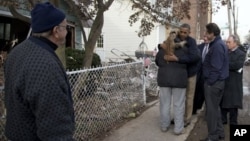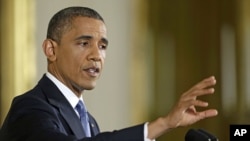U.S. President Barack Obama has surveyed some of the hardest-hit areas of New York, where many residents are struggling to recover from the effects of the Atlantic superstorm Sandy.
Obama met with storm victims and officials Thursday, on his second trip to the region of the East Coast where the massive storm came ashore last month.
The president said administration officials are working on a plan to aid the rebuilding process. He urged federal, state and local officials to put "turf battles" aside and work together.
Earlier, White House spokesman Jay Carney said the administration has obligated more than $1.5 billion to support storm response and recovery efforts, and would continue to supply "all available resources" to state and local officials.
The storm left at least 120 people dead and caused an estimated $50 billion in damage. It also devastated many of the city's seaside neighborhoods when it made landfall, leaving millions of residents either homeless or without electricity for up to three weeks amid bitterly cold temperatures.
Climate change debated
The monster storm, which struck the East Coast just days before the U.S. presidential election, has revived the political debate about climate change, which some observers blame for several recent violent weather events like Sandy.
Related video report by Peter Fedynsky
Although he did not make such a connection, Obama told reporters at the White House Wednesday he had no doubts about climate change and its effect on the environment.
"What we do know is the temperature around the globe is increasing faster than was predicted even 10 years ago," the president noted. "We do know that the Arctic ice cap is melting faster than was predicted even five years ago. We do know that there have been an extraordinarily large number of severe weather events here in North America, but also around the globe. And I am a firm believer that climate change is real, that it is impacted by human behavior and carbon emissions."
An attempt to pass a so-called "cap-and-trade" bill that would restrict emissions of carbon dioxide failed in the U.S. Congress during Obama's first term, but the president vowed to press forward on the issue in his second term.
"So what I'm going to be doing over the next several weeks, next several months, is having a conversation, a wide-ranging conversation with scientists, engineers and elected officials to find out what more can we do to make short-term progress in reducing carbons," he said, adding that he would then generate national dialog about "what realistically can we do long term to make sure that this is not something we're passing on to future generations."
The president pointed to his administration's tightened fuel efficiency standards on cars and trucks and the increased use of renewable energy to limit the country's use of fossil fuels such as coal, oil and gas.
Many scientists say climate change is caused by the release of carbon dioxide and the burning of fossil fuels, which traps heat in the atmosphere, causing a so-called "greenhouse" effect.
A number of research groups are proposing the creation of an outright tax on carbon emissions, which would make people pay more for using fossil fuels.
Some information for this report was provided by AP, AFP, and Reuters.






